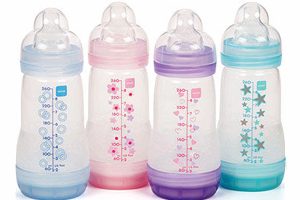
Baby Bottles Exposed Infants To BPA. Plastic baby bottles could be exposing millions of infants to bisphenol-A, a potentially dangerous chemical. A group of North American environmental and health groups released a paper Thursday revealing that many major-brand baby bottles leach bisphenol A—BPA—and is now calling for a moratorium on its use. BPA is a fairly […]

Baby Bottles Exposed Infants To BPA. Plastic baby bottles could be exposing millions of infants to bisphenol-A, a potentially dangerous chemical. A group of North American environmental and health groups released a paper Thursday revealing that many major-brand baby bottles leach bisphenol A—BPA—and is now calling for a moratorium on its use. BPA is a fairly ubiquitous chemical used in polycarbonate plastic products, including baby bottles and metal can coatings, intended to protect the food inside from the can. According to the Food & Drug Administration (FDA) and the infant formula industry—which adheres to federal packaging guidelines—BPA is legal and safe. Critics say that BPA, which mimics the hormone estrogen, causes hormonal, neurological, and behavioral problems.
Researchers tested 19 baby bottles purchased in nine U.S. states and Canada including Avent, Dr. Brown, Evenflo, Disney, Gerber, and Playtex. When the bottles were heated to 175 degrees F (80 degrees C), they all leached BPA at about five to seven parts per billion. They also found that because of the BPA’s chemical makeup, it may leach more in fatty or acidic liquids, such as milk or apple juice, than in water.
U.S. and European Union (EU) health and environment authorities still maintain polycarbonate plastic is not harmful, putting the safe level of daily BPA exposure at more than 25 times the levels found in baby bottles. Meanwhile, Health Canada, is reviewing its BPA policy; conclusions are due this spring.
BPA opponents say official safety figures are too high. In the lab, low levels have been linked to a variety of sex-hormone-imbalances, including breast and prostate cancer, early puberty, miscarriage, low sperm count, and immune-system changes. Critics also claim that in developing infants, these effects may occur at exposure levels far below what health authorities deemed safe for adults. “The reproductive system is developing, the brain is developing, the immune system is developing,” David Carpenter, director of the Institute for Health and the Environment at the University at Albany, said Thursday on behalf of the environmental agencies. Knowing that, he said, it is “absolutely obscene” to expose infants to BPA. The National Toxicology Program’s Center for the Evaluation of Risks to Human Reproduction convened an expert panel to determine if BPA is a hazard to humans, including more sensitive developing babies. The panel concluded there’s some risk as BPA exposure causes neural and behavioral effects in children. The American Academy of Pediatrics has no formal position on BPA.
In a 2006 summary explaining its review of BPA safety, the European Food Safety Authority argued that animal trials of the chemical don’t tell much about humans. Apparently, when humans ingest BPA, it’s quickly excreted through urine; when rats and mice eat it, it’s released into the bloodstream and remains in the body longer. Human data on BPA have been “really inconclusive,” says Antonia Calafat, research chemist at the CDC; however Calafat’s recent findings indicated among roughly 2,500 Americans tested in 2003 and 2004, over 95% had traces of BPA in their urine.
Legislation has been proposed in several U.S. states to limit or ban BPA use and some stores have pulled polycarbonate bottles. But, U.S. and E.U. health and environment authorities believe the evidence supports continued use of regular polycarbonate baby bottles and formula makers and the FDA say the amount of BPA in baby formula cans is not dangerous.
The personal injury attorneys at Parker Waichman LLP offer free, no-obligation case evaluations. For more information, fill out our online contact form or call 1-800-YOURLAWYER (1-800-968-7529).


